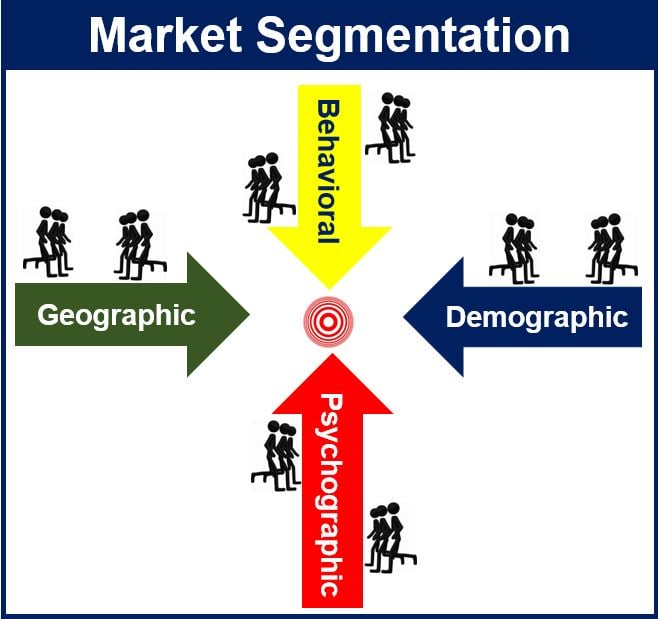What is market segmentation?
Market segmentation is a strategy that businesses use to ensure that their products or services are properly targeting the right consumer base. Experts say that market segmentation, when applied correctly, is mainly about understanding customer needs, and therefore, how they decide between one product (or offer) and another.
The basic concept behind market segmentation is that there are consumers who may want the same product but have different needs, and companies are able to focus on the needs of each individual through employing different strategies.
Companies that use market segmentation strategies are essentially able to divide a total market into individual market groups and focus on targeting these groups.

ft.com/lexicon says the following about market segmentation:
“Technically, market segmentation is the process of dividing the population of possible customers into distinct groups.”
“Those customers within the same segment share common characteristics that can help a firm in targeting those customers and marketing to them effectively.”
Maynard Robison highlights the importance of market segmentation in her article titled Market Segmentation: One Method, Four Examples:
“At a more tactical level, market segmentation can make the choices a company faces in developing products, services, and marketing messages easier. Often, market segmentation shows that many conceivable combinations of interest in product features, combinations of service needs, or combinations of attitudes are actually very rare in the marketplace.”
There are four major market segmentation strategies: geographic, demographic, psychographic, and behavioral.
Geographic market segmentation
There are cultural differences between people in different geographic locations – marketers can tailor their strategies according to these cultural differences.
Geographical market segmentation makes divisions based on geographical units, including:
- continents
- nations
- regions
- neighborhoods
Demographic market segmentation
Marketing experts can also use demographic variables.
Basing strategies on the characteristics of consumers gives companies a better opportunity to meet the needs and wants of specific people in the market.
Demographic variables include:
- gender
- age
- income
- socio-economic status
- religion
- race
Psychographic segmentation
Psycho-graphic segmentation is based on the belief that a person’s personality can influence what products they are in interested in.
According to Bournemouth University, UK, psychographic segmentation works well for ‘image-based products’ such as cosmetics, jewelry, clothing, cigarettes, alcohol, mobile phones, etc.
Psychographic segmentation divides markets based on:
- personality
- lifestyle
- values
Compound phrases with ‘Market Segmentation’
We can make many compound phrases with the term ‘Market Segmentation.’ Here are 15 of them:
-
Effective Market Segmentation
The process of dividing the market into segments in a way that is likely to yield the best response to a product or campaign.
-
Market Segmentation Strategy
A strategic approach to identifying and targeting specific groups within a broader market.
-
Market Segmentation Methods
Various techniques used to divide a market into distinct customer groups.
-
Market Segmentation Analysis
The study and evaluation of the different segments within a market.
-
Market Segmentation Basis
The underlying criteria or variables used for dividing a market into segments.
-
Market Segmentation Process
The series of steps taken to divide a broad market into discrete customer segments.
-
B2B Market Segmentation
Business-to-business market division, focusing on organizational buyers’ needs and characteristics.
-
Market Segmentation Research
Research activities aimed at understanding the composition and characteristics of different market segments.
-
Market Segmentation Management
The administration and implementation of strategies in various market segments.
-
Market Segmentation Challenges
The difficulties faced while trying to accurately divide the market into relevant segments.
-
Market Segmentation Benefits
The advantages gained from effectively dividing the market into smaller segments.
-
Market Segmentation Data
Data used or collected for the purpose of dividing the market into segments.
-
Market Segmentation Theory
Theoretical frameworks and concepts underlying the segmentation of markets.
-
Market Segmentation Practices
Established methods and procedures used to segment markets in practical scenarios.
-
Market Segmentation Software
Computer programs designed to help marketers divide the market into distinct segments.
Different languages
Here is the term ‘Market Segmentation’ translated into various languages:
- Spanish: Segmentación del mercado
- Hindi: बाजार विभाजन
- French: Segmentation du marché
- Arabic: تجزئة السوق
- Bengali: বাজার বিভাজন
- Russian: Сегментация рынка
- Portuguese: Segmentação de mercado
- Indonesian: Segmentasi pasar
- Urdu: مارکیٹ سیگمنٹیشن
- German: Marktsegmentierung
- Japanese: 市場区分
- Swahili: Ugawaji wa soko
- Marathi: बाजार विभागणी
- Telugu: మార్కెట్ విభజన
- Turkish: Pazar bölümlendirme
- Korean: 시장 세분화
- Tamil: சந்தை பிரிவினை
- Vietnamese: Phân khúc thị trường
- Italian: Segmentazione del mercato
- Gujarati: બજાર ખંડીકરણ
- Farsi: بخشبندی بازار
- Bhojpuri: बाजार के विभाजन
- Hakka: 市場細分
- Mandarin Chinese: 市场细分
- Cantonese Chinese: 市場細分
- Jin Chinese: 市場細分
- Southern Min: 市場細分
- Kannada: ಮಾರುಕಟ್ಟೆ ವಿಭಾಗೀಕರಣ
- Swedish: Marknadssegmentering
- Danish: Markedssegmentering
- Norwegian: Markedssegmentering
- Finnish: Markkinasegmentointi
- Ukrainian: Сегментація ринку

